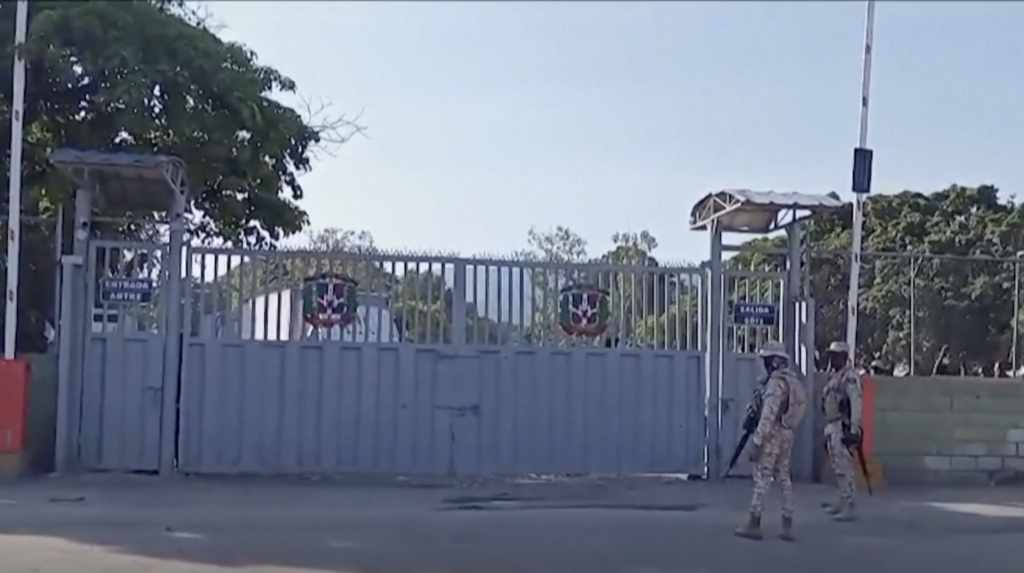
President Luis Abinader closed down all commerce with Haiti, by land, sea, or air on Friday, 16 September 2023 in the morning. Binational markets that enabled undocumented Haitians to cross over were ordered stopped in Jimani, Elias Piña and Dajabón. The Dominican government is still allowing Haitians that seek to return to Haiti to do so by a smaller single person gate at the borders.
This very stiff reaction comes as Haiti continues work on the canal that will take water from the Masacre River that divides the two nations in the north. Dominican farmers say the large canal will affect the level of water available for Dominican farmers. Local experts warn that if there are intense rains, the channeling of the waters as being carried out in Haiti will destroy crops in that country, turning the construction of the canal into a boomerang for Haiti itself.
For nearly two weeks, Dominican authorities have asked, insisted, and demanded that all work on the canal be halted, but to no avail. Instead, Haitians have hastened the construction.
The announcement of the border shut down coincides with the recent arrival of new armored vehicles for the army.
At the same time President Luis Abinader ordered the closure of the frontier, he also noted that while conversations continue to take place, the lack of control of the Haitian government of all of its territory has led him to also back that the Migration Agency (DGM) deny all visa applications from any of the “provocateurs” from Haiti.
The Ministry of Foreign Relations reported on Thursday, 14 September 2023 that the meeting of the Binational Water Table took place and the Dominican Republic maintained its position that the construction violates the 1929 treaty. The Ministry of Foreign Relations maintains that for the talks to continue, the construction of the canal needs to stop.
Issues regarding the river that divides the two countries can easily be traced back to the 1929 treaty that deals with the border. International law is also very clear on the use of waters that form a border between the two nations. When the canal was started, the Haitian authorities during the administration of the late Jovenel Moise signed on to a clause that stated technical experts would be called in to help decide the issues.
Moise would be assassinated just a few months later. The agreements signed in 2021 reiterated the need for talks and respect for border agreements, namely the 1929 agreement signed by the Presidents of both countries at that time.
As a result of the closure of the border, hundreds of Haitians began to return to Haiti through Dajabon, Elias Piña and Jimani. Merchants on this side of the border issued statements, some praising the position of the President and others not so kind, and the government announced that it would begin buying the perishable goods that would normally be sold in Haiti: eggs, poultry, and the like.
On the Haitian side, cries of “Canal or death” were heard, and the Haitian government said that it was within its rights to use water from the river.
Meanwhile, the shutdown of the border and the increase in border troops have made headlines in the media abroad.
Locally, geologist Osiris de Leon alerted that the canal could be a boomerang for farmers in Haiti. If there are intense rains, the new course of the Masacre River could overflow causing crop destruction in Haiti.
Inespre began purchases of local produce that would have been shipped by land or sea to Haiti.
Read more in Spanish:
Noticias SIN
Noticias SIN
Noticias SIN
Diario Libre
Diario Libre
Diario Libre
Diario Libre
Diario Libre
Diario Libre
El Caribe
El Caribe
El Caribe
Listin Diario
Listin Diario
Listin Diario
En Segundos
En Segundos
En Segundos
El Dia
El Dia
El Dia
Hoy
Hoy
N Digital
Jamaica Gleaner
The Washington Post
NBC News
ABC News
18 September 2023

